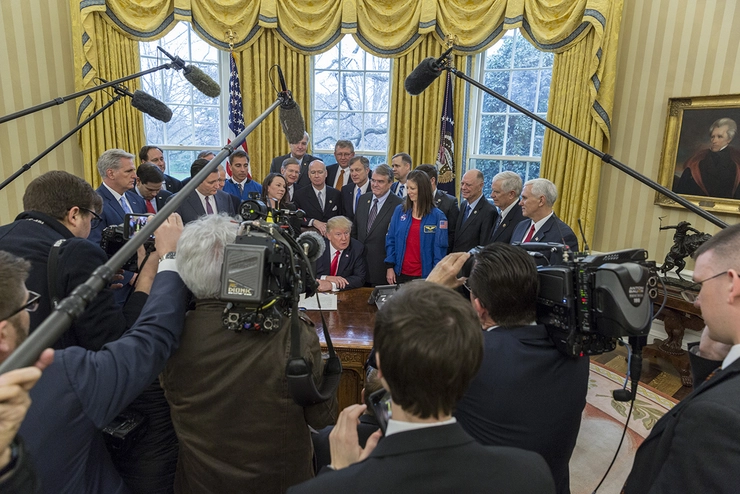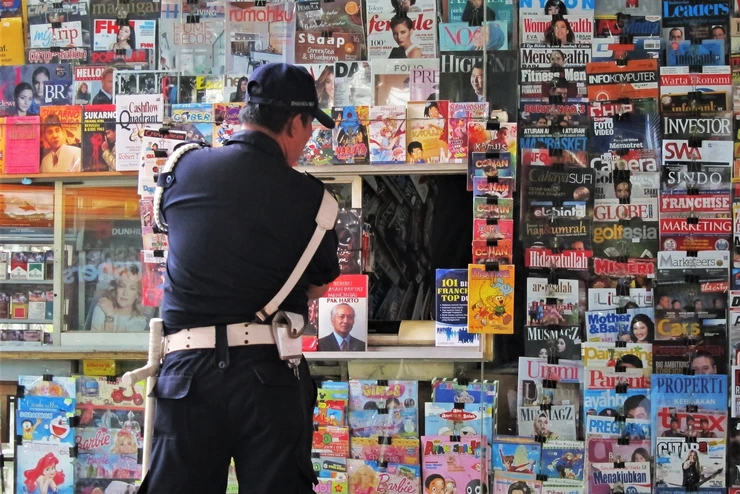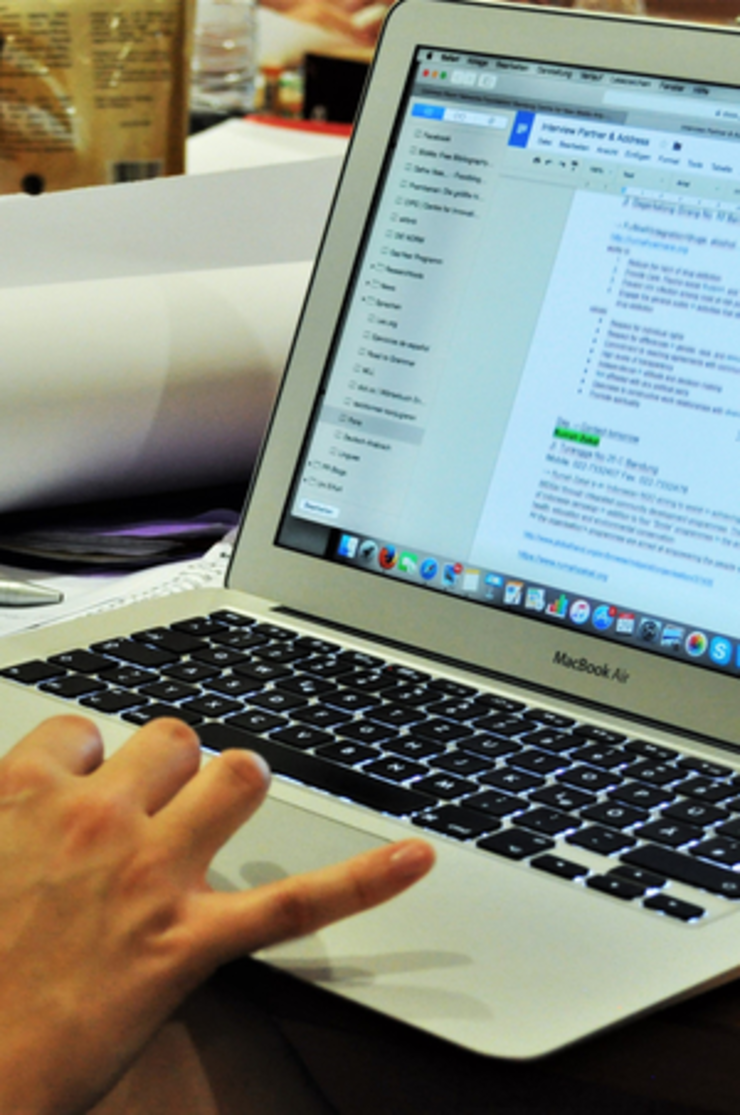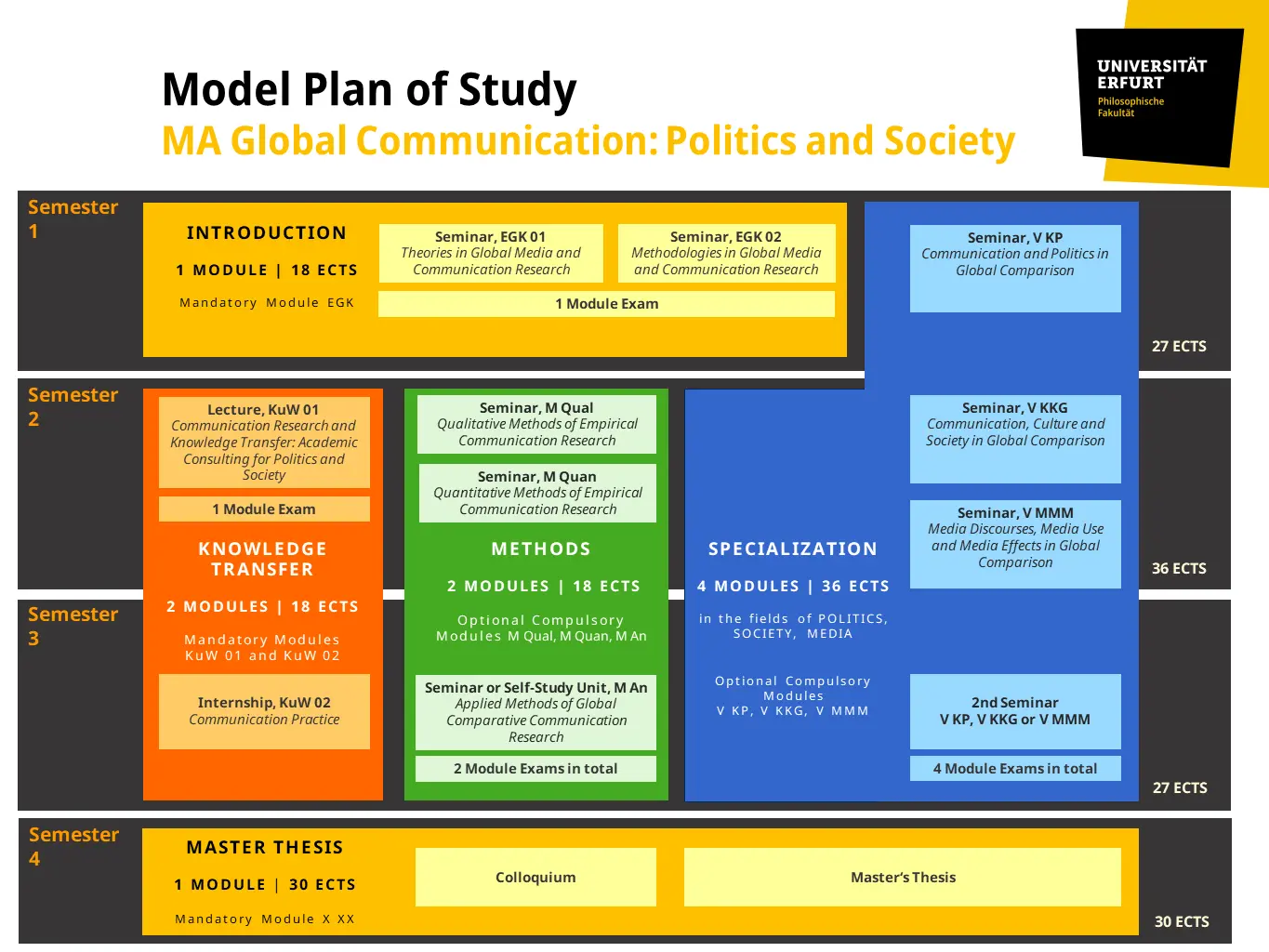Curriculum and Study Organization
Summary
The study programme of the MA "Global Communication: Politics and Society" consists of a basic introductory module on theories and methods of global comparative communication research in the 1st semester, four substantive in-depth modules in the areas of a) politics, b) society, and c) media in the course of the first three semesters, two methods modules in the 2nd and 3rd semesters, as well as two modules that build on each other and introduce students to consulting practice in communication studies and conclude with an internationally oriented internship in Germany or abroad. The Master's thesis is written in the 4th semester and presented in a colloquium.
Modules
In the first semester, you will start with the mandatory introductory module EGK – Introduction to Global Media and Communication Research, in which all students of the master program learn the theoretical and methodological basics of global comparative communication research. The module consists of two seminars and will be finalized with a comprehensive module examination.
First Seminar: Introduction to Theories of Global Media and Communication Research
- international comparison of forms of communication of organized social systems (i.e. political system, business, social movements, network society; industrial and developing societies, law/regulation, social implications of media technology);
- international comparison of communication cultures in human „lifeworlds“ (i.e. interpersonal, intercultural or rather interpersonal mediated/non-mediated group and individual communication, traditional and modern communication);
- international comparison of intermediated spheres of media and public spheres (i.e. media typologies, global/transnational/multi-ethnic public spheres, journalism ethics, new digital public spheres).
Second Seminar: Introduction to Methodologies of Global Media and Communication Research
- basics of international comparative social empirical research (i.e. "most-similar"/"most-different" comparisons, synchronous/asynchronous comparisons, modernity as multi-sectoral process, modernization and dependency theories);
- context and theory sensitive handling of methods of enquiry and evaluation in qualitative and quantitative social empirical research;
- reflection of research practices of "other-awareness", field research/distant remote research, language competence, area competence, tapping of sources, securing data and non-verbal observational research.
In the mandatory module [KuW_01] - Communication Research and Knowledge Transfer: Academic Consulting for Politics and Society, you will learn the basics for profound communication science consulting for politics, business, society and the public in a participatory lecture series in the 2nd semester. Afterwards, you will apply your knowledge during an internship in the module [KuW_02] - Communication Practice in an internationally active institution or enterprise.
Lecture: Communication Research and Knowledge Transfer: Academic Consulting for Politics and Society
- Introduction of central developments in the blossoming vocational field of communication consultancy in politics and society exemplified through the areas of specialization of the professors, among them policy consulting, health consulting, education consulting, journalism consulting, international cultural consulting
- Reflection of fields of consulting: internal communication (i.e. business communication, media competence), external communication (i.e. PR, campaigns, public diplomacy) in all societal sub-systems and their institutions and organizations
- theory and hypothesis based approach
Internship: Academic Consultation for Politics and Society
You receive detailed information on the process of the internship here.
Note: For students studying according to the examination and study regulations M_PO_Kom-2018, the lecture and internship are still integrated in a cross-semester module [KuW]. In the new study regulations M_PO_Kom-2023, these contents are to be studied in the two combined modules as described above.
From semester 1 to semester 3, students can set an individual focus in various application areas of global comparative communication research by combining in-depth modules in the areas of political communication (in short: politics), social communication/culture (in short: society) and media communication (in short: media).
Students must take at least one module from each area and you can set a focus with your fourth module by taking one module twice; you therefore choose 4 out of 3. Each module consists of a seminar and a module exam. We recommend that you start with an in-depth module in the first semester, take two more in-depth modules in the second semester and finally complete your specialisation with a in-depth module in the third semester before writing your Master's thesis.
Module [VKP] - Communication and Politics in Global Comparison

- Political communication is defined as both mediatized as well as non-mediated communication in the political system, in organized and non-organized public spheres and in private communication (lifeworld).
- The micro-, meso-, and macro-level is taken into account in all societal subsystems. This is congruent with the socio-political, institutional and organizational, and individual/group imprint. International comparisons will be highlighted.
- Discussed research areas and topics in this module are inter alia: public sphere theory, systems theory, rational choice/decision making theories, organizational theory and comparison of developments in the field of communicaiton policy/censorhip, election campaigning, campaigns in the field of health communication, state propaganda and PR, media democracy, media in transformation, political media effects, social implications of social media, political implications of media technology, political attitudes and opinion research, politainment, political culture, political communication in historical comparisons, visual communication in political contexts.
- In this module, various forms of transborder effects along the lines of the political communication module will be reflected.
Module [VKKG] - Communication, Culture and Society in Global Comparison

- Social communication will be defined as mediated as well as non-mediated (direct) communication in organized and non-organized parts of the public sphere and in private interpersonal communication reflecting media and/or social processes.
- In all societal subsystems micro, meso and macro level influences must be taken into consideration, even though awareness will be shifted from organized to non-organized social systems.
- While the main aspect of political communication are political and economic systems, social communication in this module deals with communication processes and communication cultures of social movements, non-organized/digital communities and also small groups and individual life worlds. The connection between culture and society is of prime importance. All these questions will be discussed with regards to global comparisons.
- Fields of research and phenomena will be, for example: theories of culture and media, sociological communication theories, Development Communication, communicative aspects of Cultural and Postcolonial Studies (i.e. life world receptions and appropriations), centralized/decentralized public spheres, structural changes of privacy and publicness, interpersonal and interactive communication cultures, traditional/modern communication, roads to social empowerment, media socialization of children and adolescents, the communicative construction of racism, multi culturalism and diversity.
- In this module, various forms of transborder effects along the lines of the political communication module will be reflected.
Module [VMMM] - Media Discourses, Media Use and Media Effects in Global Comparison

- The module contains aspects of classical media research/media communication in global comparative perspective.
- While in other modules the social and political implications of mediatization are reflected, media changes themselves are at focus in this module.
- At the core is the examination of all forms of mediatized communication, from classical mass media to new forms of digital/social media. Issues of the module are: media integration and media change (historical changes in analog and digital media worlds, digitalization), media discourses and media content research, media production, media organization, media effects and usage. On the basis of state of the art empirical research, knowledge about classical mid-range theories (agenda setting, spiral of silence, cultivation, opinion leadership etc.) and structuralist as well as post-structuralist approaches to media (system theory, Symbolic Interaction etc.) will be deepened.
- Various media genres in the spheres of entertainment, knowledge and information (Edutainment, Politainment etc.) as well as cultural comparative media history, media ethics and media self-control play an important role.
- Similarities and differences of the modernization of media and media changes in different countries, regions and cultural spheres will be reflected and overriding paradigms like “globalization”, “modernization” and “mediatization” are discussed.

Also in the second and third semester you engross you knowledge of methods. Since basic knowledge in enquiry and evaluation procedures is taken for granted, this module concentrates on the practical realization of research. You must choose two of the three available methodological modules.
Modul M Qual – Qualitative Methods of Empirical Communication Research
and/or
Modul M Quan – Quantitative Methods of Empirical Communication Research
- Knoweldge of concrete application of individual procedures will be deepened in seminars.
- Project and group work will be at the core.
- The modules each consist of one seminar plus a module exam.
and/or
Module M An – Applied Methods of Global Comparative Communication Research
- Depending on the availability the module can be passed as a seminar or as a self study unit; it will be finalized with a module exam.
- Research designs for global comparative issues will be developed.
Master's Thesis
You can choose a supervisor by yourself. All professors and authorized examiners who are offering courses in the MA Global Communication: Politics and Society can supervise your master thesis.
We recommend you to contact us in good time if you have an idea for your work. You will then agree on a topic of your choice with your supervisor.
Registration Process
Usually, you present an initial idea to your supervisor and write an exposé for the planned project. Once your first supervisor agrees upon the project and a second supervisor is found, you can register your thesis officially with the Deans Office and register for the MA colloquium on ELVIS offered by your first supervisor immediately.
You will have to formally apply for your master's thesis in the Dean's Office of the Faculty of Philosophy using the official form in the German version (English fill-in assistance available) and an up-to-date matriculation statement. Remember that signing up requires signatures from everyone involved. The contact person in the dean's office is Ms. Romy Klaer.
Please note that you need to add a short written request to appoint an external second supervisor with your registration if the person is not part of the regular staff at the University of Erfurt. The first supervisor needs to agree upon the external supervisor appointment.
Additionally, we ask you to send a short form to the MA GlobCo Team via Email (ma-globalcommunication@uni-erfurt.de) about your official registration. We will need this information for a smooth organization of the MA colloquia.
Forms and Links
- Official Registration Form: https://sulwww.uni-erfurt.de/Dokumente/PA/PA__M_HA_Antrag__SUL20150630.pdf
English Language Assistance for the German Form: https://www.uni-erfurt.de/fileadmin/fakultaet/philosophische/Dekanat/Masterarbeit/Template_Thesis_Topic_Issuance.pdf - Contact person for master theses at the Faculty of Philosophy: Romy Klaer
- Information provided by the Philosophical Faculty
- Form for Registration in the Master's Program
Registration Steps in a Nutshell
- agreement with supervisors, including exposé
- registration for MA colloquium with first supervisor on ELVIS
- official registration via the Deans Office at the Faculty of Philosophy
- registration to MA GlobCo for MA colloquium coordination
Fast Track to PhD
In their fourth semester, the participants admitted to the "Fast Track" program complete a master's thesis in accordance with § 21 Para. 1 M-RPO in the range of approx. 25,000 words. By doing so, on the one hand, candidates show that they can work independently on the topic given according to scientific methods and to present the results appropriately within the allotted time. On the other hand, they also justify acceptance as a doctoral student with a topic based on the master's thesis.
Regarding the requirements for the master thesis, the procedure and the responsibilities, especially the supervision, the rules of §§ 21 and 22 M-RPO apply. The doctoral committee of the Faculty of Philosophy decides whether the master's thesis completed as part of the “Fast Track” program can also be accepted as initial part of the doctorate.
- Shortening the doctoral phase by at least one semester (due to the preparatory work in the master phase)
- Simplified admission to the doctoral college (preparation of an exposé is not required) and acceptance as a doctoral student in the Faculty of Arts after completion of the master's degree
- Early involvement in the ComDigMed doctoral program - the master's thesis can be presented and discussed
- Follow-up support after the master's thesis and support in the use of the knowledge gained
The application for admission to the Fast Track program must be submitted to the responsible master program officer by July 15 or January 30 of the respective year (usually in the third semester).
The following must be attached to the application:
- a complete list of all courses taken in the first two semesters as well as the assignments of the third semester
- a max. three-page letter of motivation, which explains the reasons for the "Fast Track" application and its embedding in the personal study and life planning
- a max. five-page sketch of a possible research topic for the master's thesis. The suitability of the topic has to be declared by a university lecturer in written form.
The seminar council first decides on admission. If the vote is admissible, the application will be approved by the Master's Examination Committee at least four weeks before the start of the lecture period.


